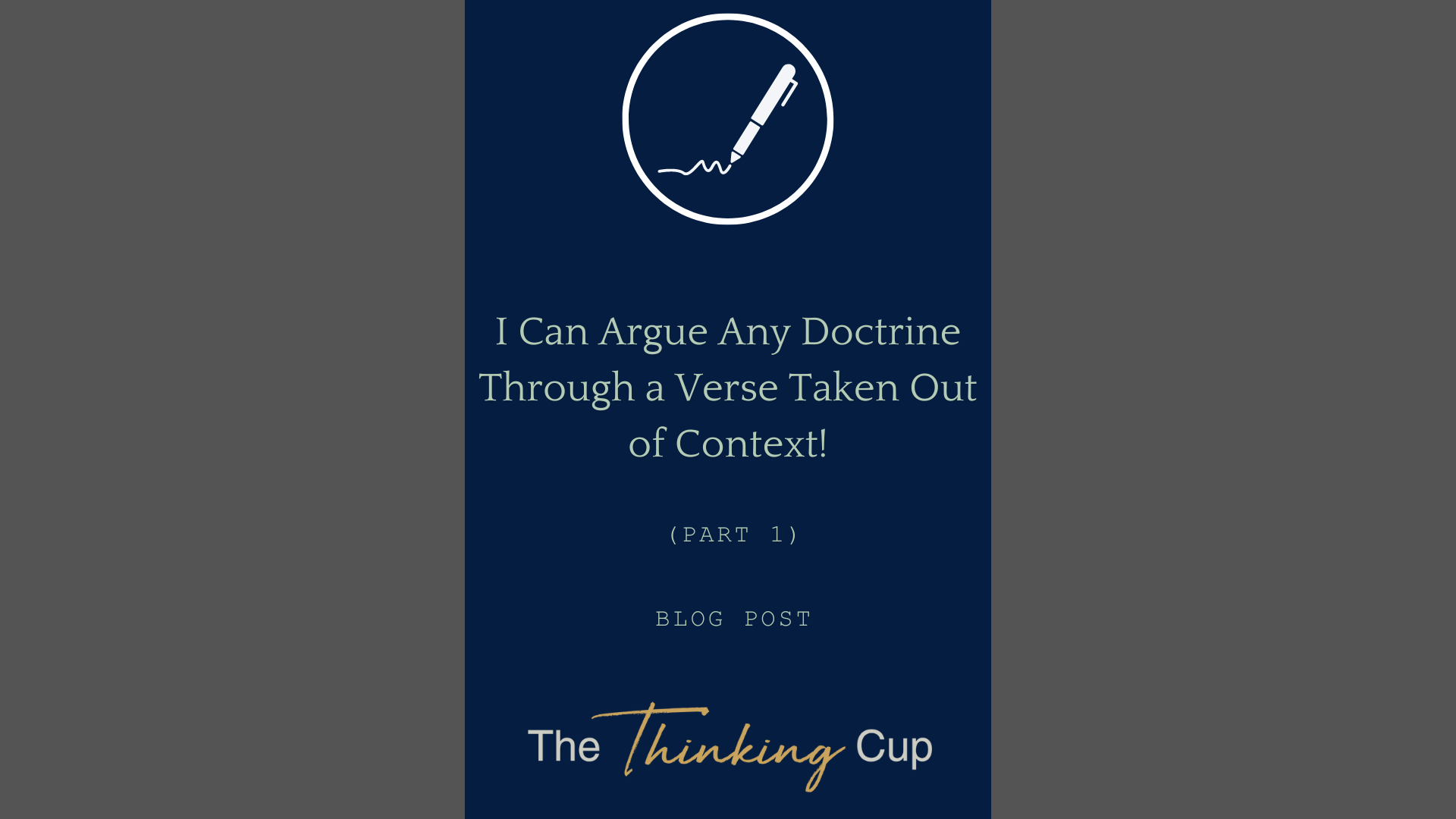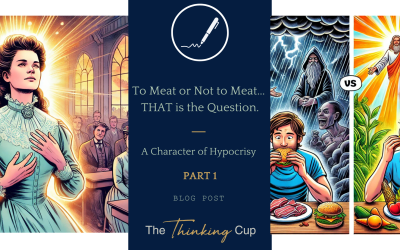Adventists and other Christians knowingly and unknowingly ignore Scripture’s contexts (the covenantal, historical, cultural, theological, political, social, audient, immediate context, and the context that created the verse being quoted or discussed).
This faulty hermeneutical principle and assumption is dangerous and divisive inside the body of Christ. The Bible contains many contexts, but our personal lives, theology, problems, and agenda are not one of them. So, we must be diligent not to read those ‘contexts’ into the Bible.
One of the more frustrating aspects of engaging in a dialogue with an Adventist is that they tend to ignore Biblical context.
I will pause for a second to remind the reader that my entire life, 40+ years, has been ingrained in Adventism. My understanding of scripture was trained and guarded to align with Adventist theology. And I know, if you are an Adventist and you are reading this right now, you are probably thinking, “Mike, Adventism is Bible-based. So what you were taught was the truth! Right?”
That’s what every church teaches. Every Christian believes that what they understand in Scripture is Bible-based. No Christian thinks that their beliefs are based on something other than Scripture. So why does Adventist understanding and interpretation differ so much from the rest of Christianity?
It’s because the Adventist lens of interpretation isn’t based ONLY on Scripture! At the Church proper level, Ellen White’s statements are the only context they seem to care about and argue to maintain. They quickly state, “You don’t understand, you’re taking her out of context!” when they think someone is misrepresenting or misinterpreting Ellen White (which is always the argument if a statement seems to misalign with their thoughts). Still, they don’t seem to place the same standards on biblical texts or passages. They seem to have no regard for dealing with the text from a biblical context because the biblical context often doesn’t favor their interpretation.
 Context is King in Biblical studies and interpretation. If we aren’t careful, our own personal bias will drive the lens through which we see the interpretation, and the Bible will say what we want it to say. This is the danger of viewing the Bible through ANY denominational lens. If we are required to see only what a church states is “TRUTH,” then we prevent ourselves from allowing the Holy Spirit to work on our hearts and minds through the Word of God.
Context is King in Biblical studies and interpretation. If we aren’t careful, our own personal bias will drive the lens through which we see the interpretation, and the Bible will say what we want it to say. This is the danger of viewing the Bible through ANY denominational lens. If we are required to see only what a church states is “TRUTH,” then we prevent ourselves from allowing the Holy Spirit to work on our hearts and minds through the Word of God.
“I can do all things through him who strengthens me.” (Php 4:13)
If we read Philippians 4:13 out of its original context, we can make this verse say what we want. I can do anything that God wants me to do. This isn’t the context the author was writing about!
Mark 2:27 says, “The Sabbath was made for man, not man for the Sabbath,” for an Adventist, this means that the Sabbath is binding on all of humanity and is one of the proof texts shared on Facebook as a ‘gotcha’ statement. See, you forgot about this text. Silly Sunday churchgoer, you forgot about that one! I have been told at least a half dozen times over the last couple of weeks that my understanding of Ellen White’s quotes that were being posted on the interwebs was out of context and misleading. Some even had the audacity to claim ‘Mike, I know what she meant and it wasn’t what you think she meant.”
The irony is Ellen White wrote ALL of her letters, books, newspaper articles, and manuscripts in ENGLISH. No other language. Scripture, on the other hand, was written in Hebrew, Aramaic, and Greek. And if you study Semitic languages, you know that there are other surrounding nations’ languages that are also important to understand and study. All of the languages must be translated into English, and we know that things can be lost in translation. This is why Biblical language study is so important. Ellen White wasn’t in another language. And yet she is claimed to be taken out of context MORE OFTEN in Adventist discussions than Scripture itself. I’m digressing now…
Back to Mark 2:27. The statement about Sabbath in Mark 2:27, contextually refers to a question that the Pharisees asked in response to something that Jesus had allowed His disciples to do on the Sabbath. At this time in the New Testament narrative, the Sabbath was necessary only because of its Jewish context. Jesus was claiming a level of authority over the Sabbath. He wasn’t trying to tell the Pharisees that the Sabbath was for the entire world to keep like they were keeping it.
“Jesus declares that ‘the Son of man is lord even of the Sabbath.’ His statement can hardly be synonymous with ‘the Sabbath was made for humans’ (Mk 2:27 only), as if to say that all people can be flexible in their Sabbath observance. Jesus is demonstrating his personal authority to interpret God’s Law.” [1]
In context, the statement is a defense offered by Jesus to justify His disciples breaking the Sabbath to satisfy their needs. It puts the Sabbath under Jesus’s and communicates His divine nature concerning the law. Jesus claims that He has the authority to interpret the law because He is lord of it! But Adventists ignore the context and flip this statement around to mean all “man” is under the Sabbath and make it universal, mandatory, and salvational. It’s a gross misuse of the Biblical text and wildly out of context.
Romans 3:31 is another text that Adventists will use to attempt to prove that we should uphold the Ten Commandments by being under them and keeping them.
“Do we then overthrow the law by this faith? By no means! On the contrary, we uphold the law.” (Ro 3:31)
It is easy to pull a text out of its context (by context, I mean the context that created the verse in the first place) and then use it as a proof text to claim the author is stating what you think it means. If you go back to verse 21 in Romans 3, we can begin to get a better understanding of what Paul is claiming here:
“But now the righteousness of God has been manifested apart from the law, although the Law and the Prophets bear witness to it—” (Rom 3:21)
Paul is arguing that God’s righteousness is revealed apart from the Law. And that this righteousness of God is testified of through the Old Testament (the Law and the Prophets, a common phrase used for the Hebrew Old Testament Scrolls). He says that Gentiles are justified outside of the law by faith, while Jews, who were under the Law, are justified through the same faith. Everyone is justified by faith apart from the deeds of the Law, and because of that, no one can boast about being saved by keeping the Law. As a result, the Law is upheld because it drives the Jew to faith in Christ for justification. And it confirms that Gentiles are justified by faith apart from the Law, just as the Law testifies. In other words, the entire function and purpose of the Law is upheld. The Law is not made void through faith, but rather, it is upheld through faith. Paul is arguing for this here, but Adventists make it mean that we are under the Law and are justified only by perfect obedience to it.
Ellen White even further extends this idea. She twists and complicates the Gospel by making statements like these:
“The Pharisees held the reverse of the modern position, but were in just as great an error. They rejected Christ, but exalted the law. And it makes little difference which position is taken, so long as we ignore the true one,—that faith in Christ must be accompanied by obedience to the law of God.” [2]
“That which God required of Adam before his fall was perfect obedience to His law. God requires now what He required of Adam, perfect obedience, righteousness without a flaw, without shortcoming in His sight. God help us to render to Him all His law requires. We cannot do this without that faith that brings Christ’s righteousness into daily practice.” [3]
This is NOT what the Word of God teaches. This isn’t what Paul is arguing for in Romans 3. We must be careful not to preach or teach a different Gospel. And we must be equally cautious of others trying to preach a different Gospel. Paul spoke several times about this concern to the early church believers:
“I am astonished that you are so quickly deserting him who called you in the grace of Christ and are turning to a different gospel— not that there is another one, but there are some who trouble you and want to distort the gospel of Christ. But even if we or an angel from heaven should preach to you a gospel contrary to the one we preached to you, let him be accursed. As we have said before, so now I say again: If anyone is preaching to you a gospel contrary to the one you received, let him be accursed. For am I now seeking the approval of man, or of God? Or am I trying to please man? If I were still trying to please man, I would not be a servant of Christ.” (Ga 1:6–10)
And then again in 2 Corinthians 11:4,
“For if someone comes and proclaims another Jesus than the one we proclaimed, or if you receive a different spirit from the one you received, or if you accept a different gospel from the one you accepted, you put up with it readily enough.” (2 Co 11:4)
I bring these statements from Paul into this conversation because we should be bold enough to claim that if any teaching, preaching, or interpretation that claims a different Gospel than the one that Paul was given, we can stand up and state, “Heresy and Blasphemy!” The person who teaches and preaches such a different gospel will be cursed!
This is why I can boldly state that Ellen G. White’s gospel, one that requires sinless perfection through obedience to the law, is a false Gospel, and because of it, she is cursed! You don’t have to like that statement, but it’s the condemnation from the Word of God through the Apostle Paul.
(We will continue the discussion in Part 2 of this post)
[1] G. S. Shogren, “Authority and Power,” in Dictionary of Jesus and the Gospels, ed. Joel B. Green and Scot McKnight (Downers Grove, IL: InterVarsity Press, 1992), 52.
[2] Ellen Gould White, The Signs of the Times, n.d., 784.
[3] Ellen Gould White, Selected Messages From the Writings of Ellen G. White, Book 2 (Review and Herald Publishing Association, 1958), 380–381.




Very well stated Mike. This is a problem that many denominations need to really look at and correct. People need to think about what they believe and why they believe it.
Appreciate your thoughts! If we are to image God well, then we must uphold Scripture well! 🙂 Not the image of a denomination!